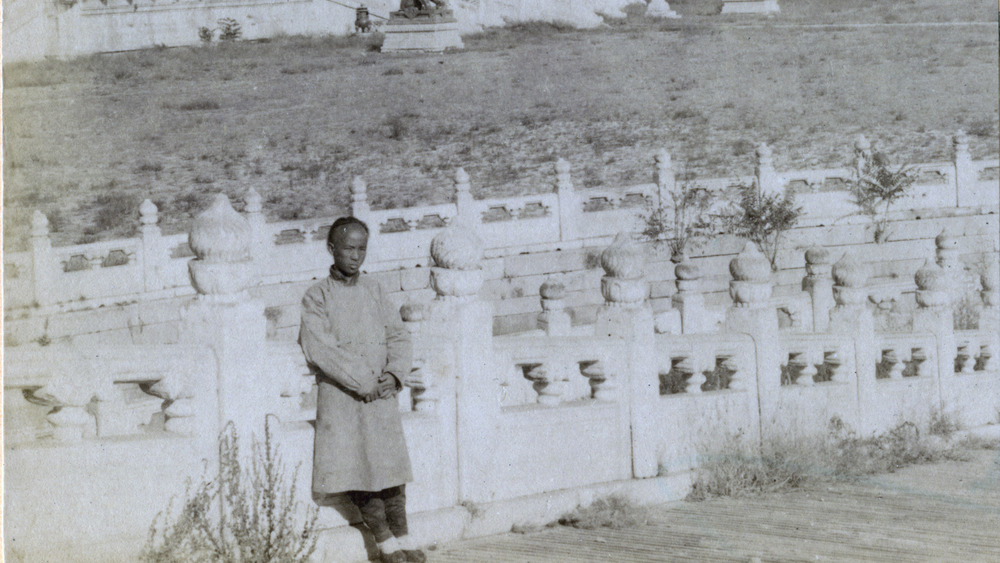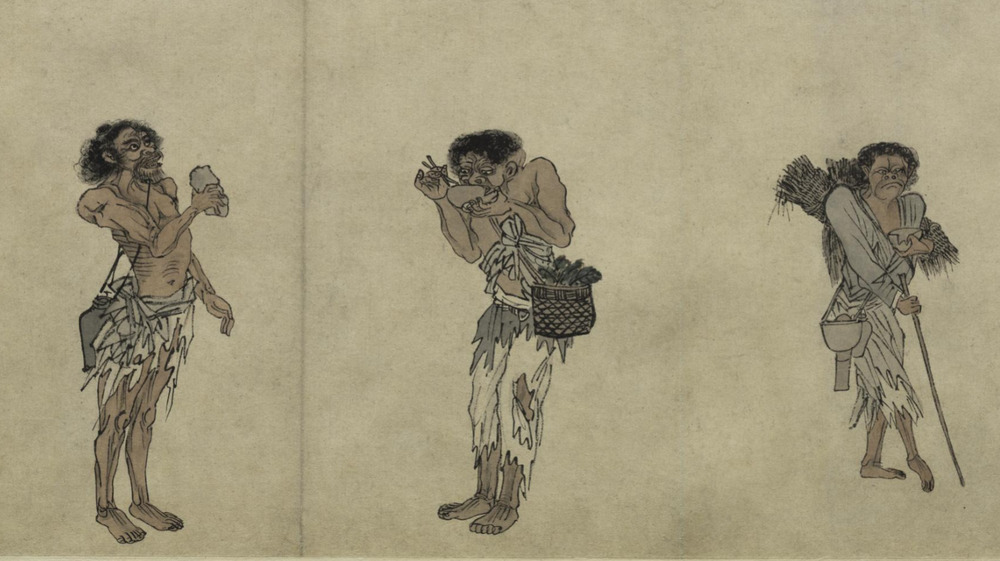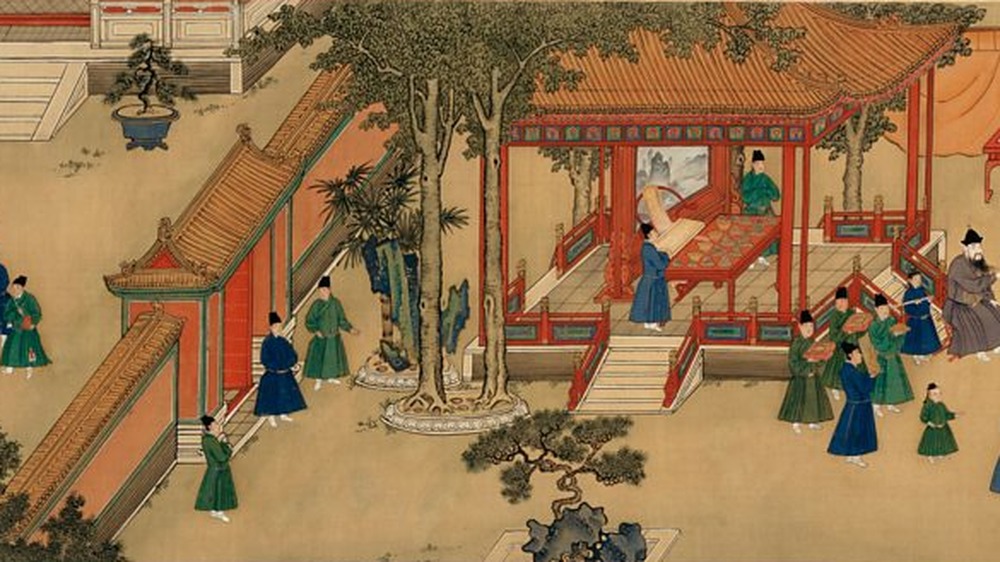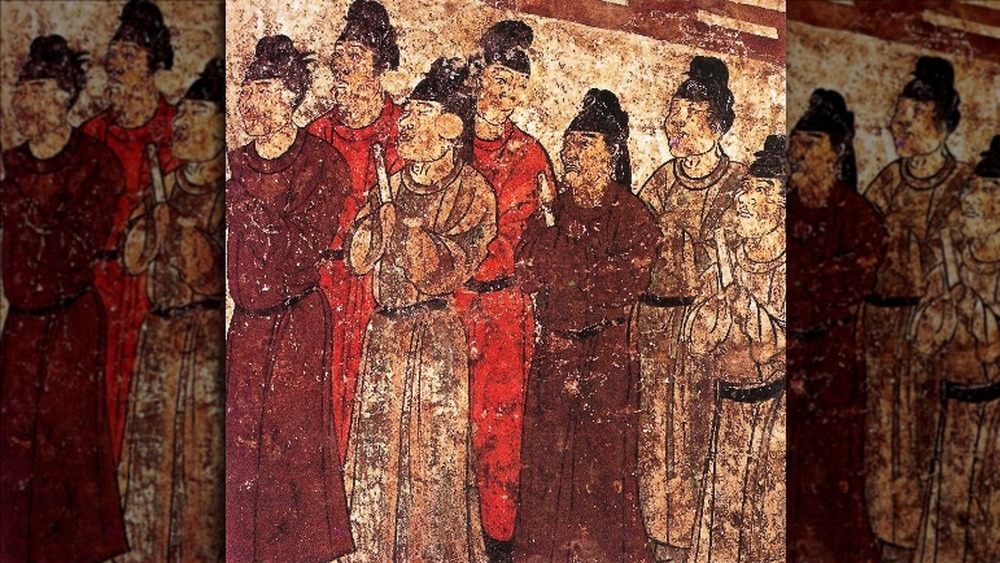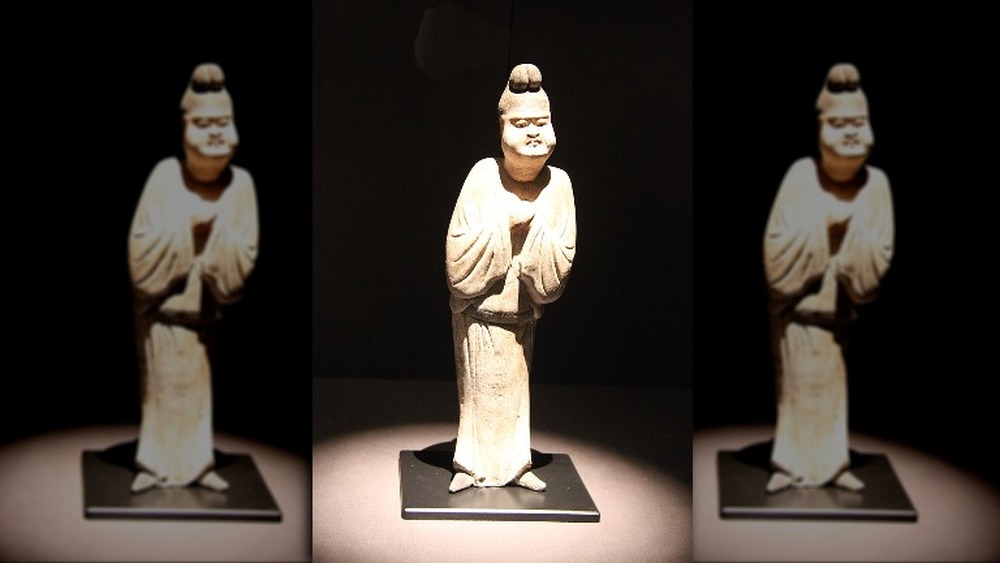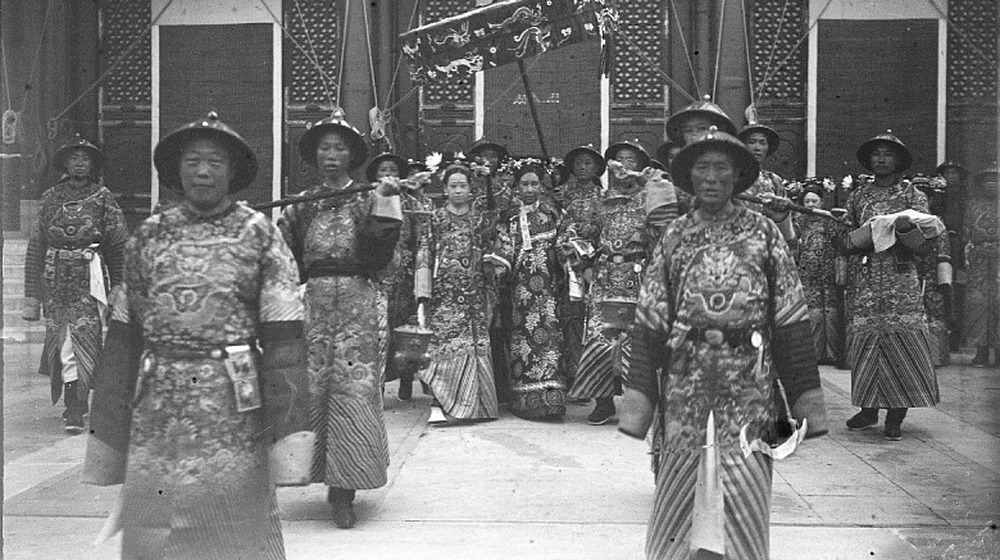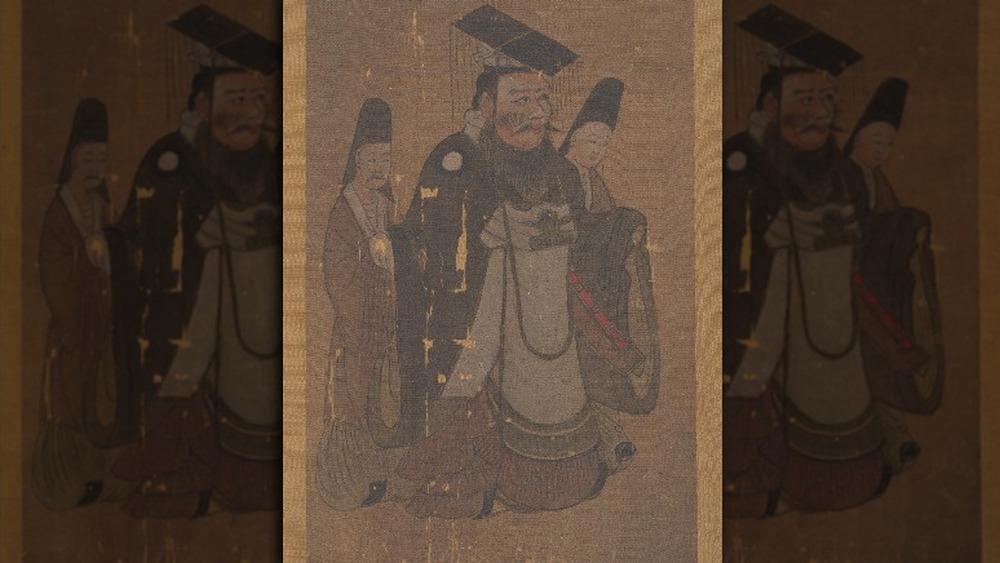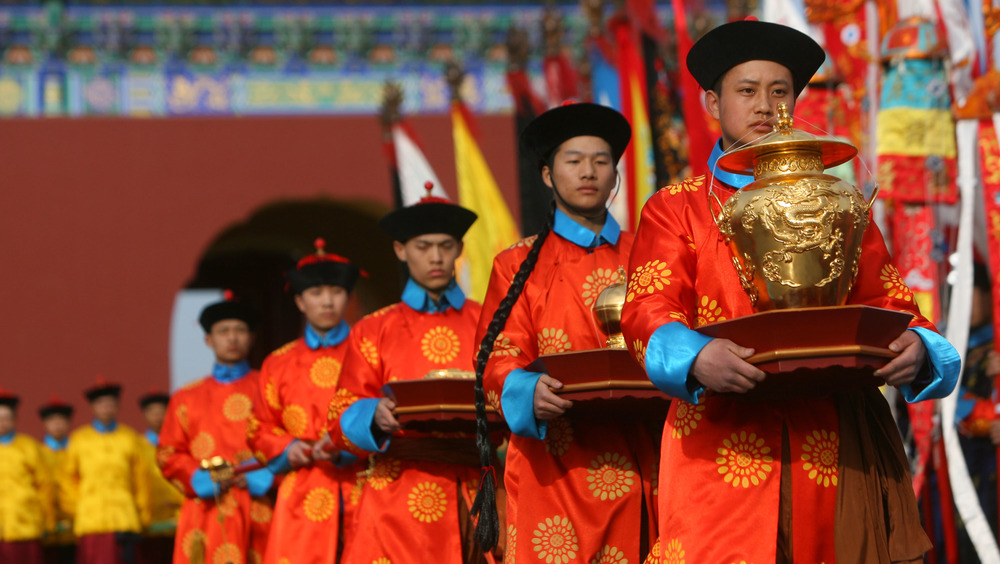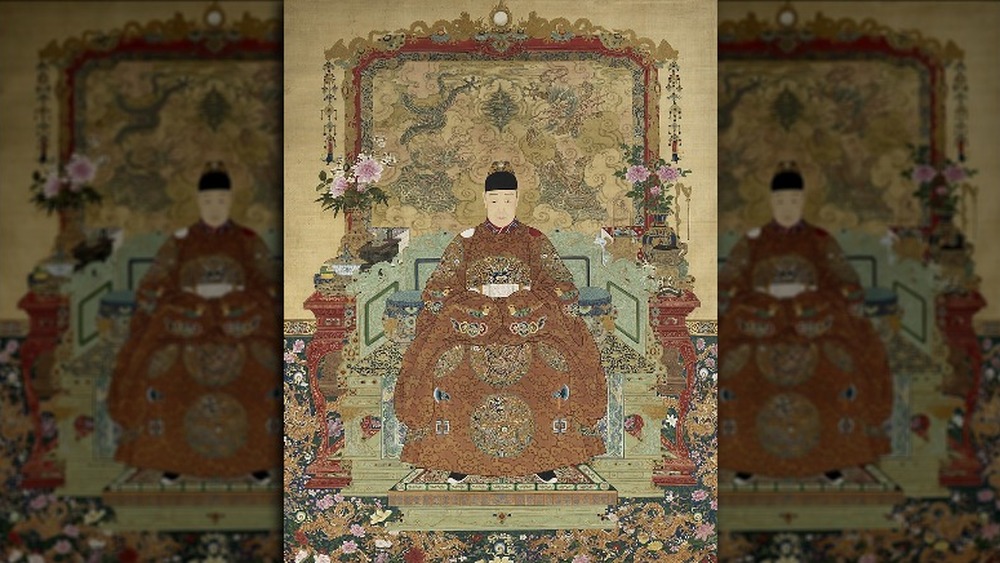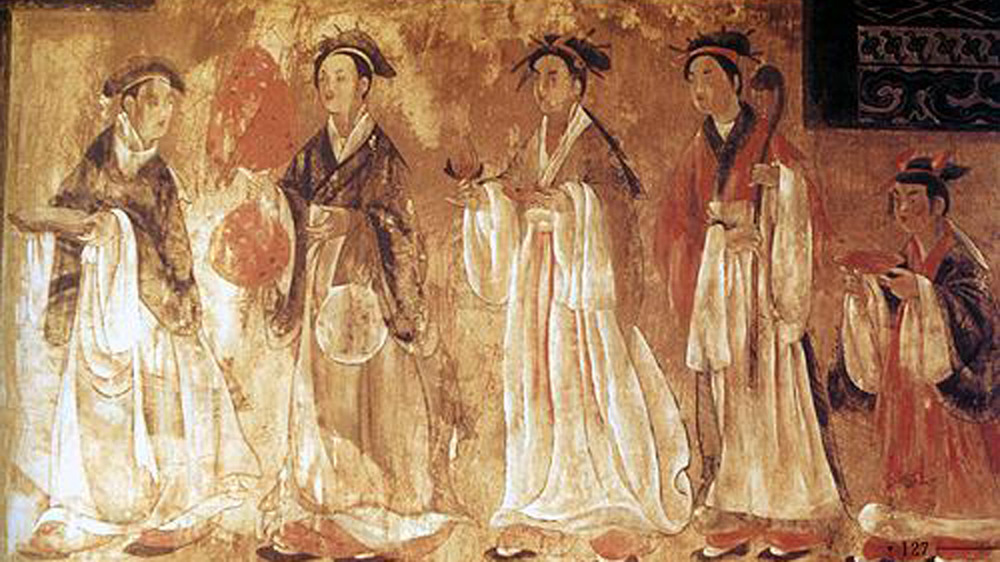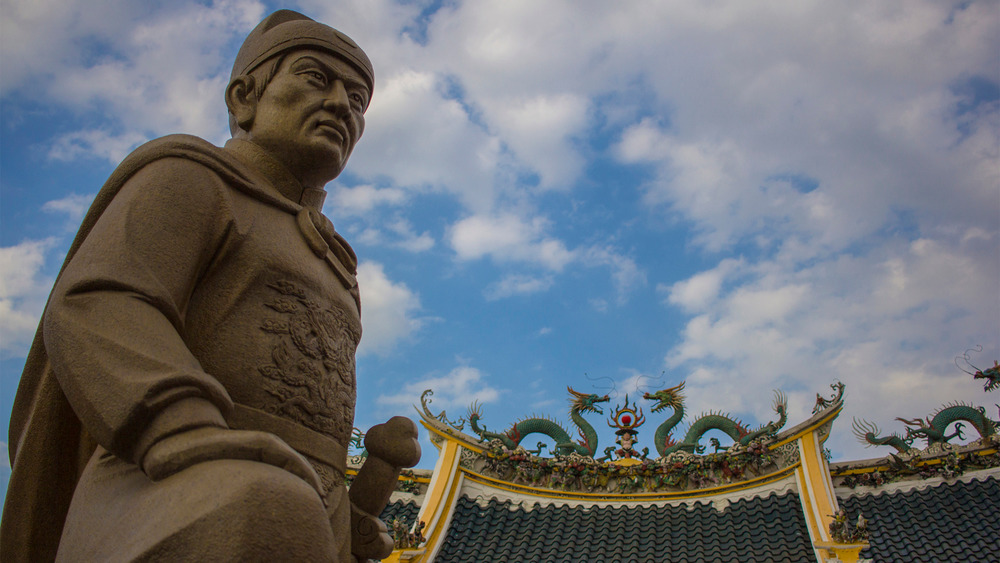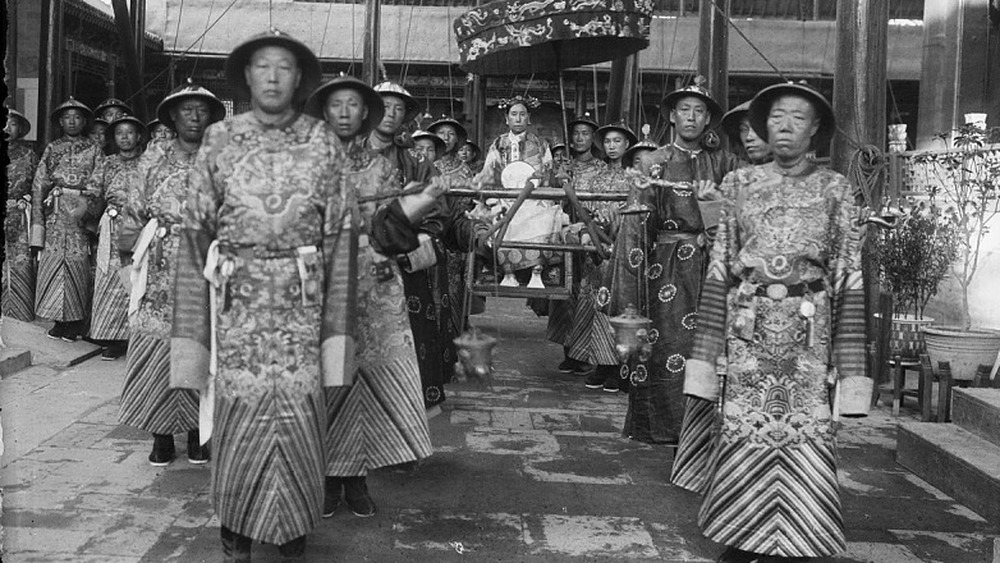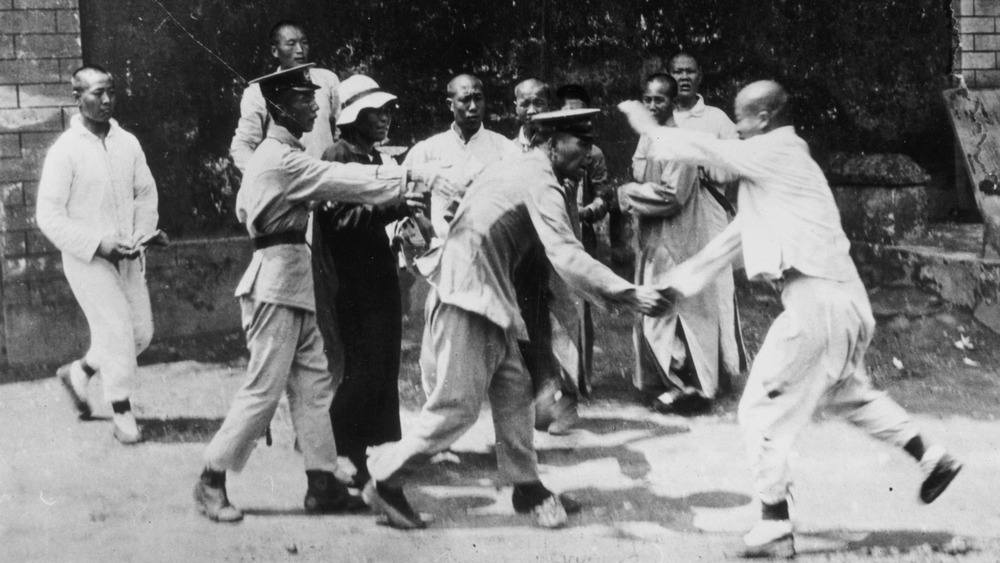What It Was Really Like Being A Eunuch In Imperial China
Over the 2,000-year history of Imperial China, an influential group of emasculated men became notorious for dominating the Forbidden City. As the only men allowed to serve in the imperial household and be near the emperor's thousand-women harem, eunuchs got their start as trusted lowly servants in ancient royal households. Unsatisfied with that status, though, eunuchs soon became notoriously driven by political ambition and would take advantage of their close proximity with the imperial family and court. Some eunuchs even managed to become infamous dictators of China, with power that surpassed that of the emperor.
But, by definition, the life of a eunuch literally came with sacrifices. Despite the potential for influence, it was often desperation that drove young boys and men to undergo the castration process and dedicate their life to working in a palace. And besides working in the imperial city, there weren't many other opportunities for eunuchs, who were shunned by the rest of society. Here's what it was really like being a eunuch in Imperial China.
Most eunuchs came from poor backgrounds
As one could imagine, becoming a eunuch and serving the imperial family was rarely a first-choice career. According to South China Morning Post, most eunuchs came from poor backgrounds, either as they were growing up or once they became adults. It wasn't uncommon for struggling families to coerce their son to become a eunuch in return for a cash reward and the guarantee that their child would live a stable and employed life at the palace, as well as potentially amass great power and influence. China Knowledge described how some fathers would even castrate their own sons at home to ensure their employment as palace eunuchs.
That was the case with Sun Yaoting, a eunuch who agreed to go through the painful at-home castration process and seek a position in the palace in hopes that he "might one day be able to crush a bullying village landlord who stole [his family's] fields and burned their house," as described by Reuters. Eunuchs who became emasculated as adults were often those who saw life as a eunuch as better than living a life stuck in poverty or constantly laboring.
On the other hand, there were some eunuchs who simply had no say in the matter. First ordered by Emperor Guangwu (57-25 B.C.) of the Han dynasty, criminals with death sentences were castrated instead.
It took about 100 days to fully heal from the castration procedure
Eunuchs were so integral to life in the imperial city that there was a specialized establishment called a "Ch'ang tzu" right outside the palace walls where the castration procedure took place, as described in The Journal of Clinical Endocrinology & Metabolism and South China Morning Post. It was operated by specialists who would pass the trade down to their sons, as well as work with several apprentices and assistants. The operation was typically performed by a team of four, with three assistants needed to secure the patient and prevent any sudden movements. During the late Qing dynasty era (1644 to 1912), without modern medicine, hot chili sauce was used as an anesthetic and hot pepper water as a disinfectant during the operation.
As scarring as the process may have been, it was the hours and days immediately after the procedure that was said to be the most painful. Rather than resting right after the operation, the eunuch had to be walked around for three hours, with help from the assistants, before he was finally able to lie down. Then, for three days straight, he wasn't allowed to drink any fluids or urinate. Full recovery tended to take up to 100 days, during which the eunuch was barely able to move, and then it was straight to work at the imperial palace.
Preserving their "bao" until death
According to South China Morning Post, becoming a eunuch did not mean completely parting with one's genitals or "bao," which means "the three preciouses." After the castration procedure, new eunuchs were expected to claim their bao, which was then preserved in liquid in a container and kept until death. Bao was needed throughout a eunuch's life, particularly if they wanted to improve their rank and roles. Advancing in rank could only happen after strict testing, which included an inspection of their preserved bao. Eunuchs who somehow managed to be without their bao would often resort to borrowing, renting, or buying new ones.
It was also culturally important for the eunuchs to be buried with their bao so that they could go into the after-life as whole men again. According to Chinese lore, "the king of the underworld would turn those without their bao into a female mule." Similar to the rank examinations, eunuchs who were missing their bao would take great efforts to find a replacement before their death. A topic of great sensitivity, the eunuch Sun Yaoting cried only twice while talking about his life — once when describing his castration and once when he recalled how he lost his "treasure," as told by Reuters.
Eunuchs shared some common physical traits
With their source of male hormones cut off, most eunuchs underwent a series of changes that made them share distinct physical traits. According to Psychology Today, eunuchs were typically beardless with reduced body hair growth. With reduced muscle mass and physical strength, their bodies became flaccid while their breasts often got bigger, and they were generally too weak to do any hard labor, as described by South China Morning Post.
Most distinct, though, were eunuchs' high voices, atypical walking style, and occasionally bad odor. Eunuchs who underwent emasculation before puberty would keep their high-pitched voice, while those who went through the procedure after puberty "spoke in a cracked falsetto." The peculiar way they walked also made eunuchs easily recognizable. Clearly affected by their emasculation, they would take short, slow steps with their toes pointed outward and body slightly shifted forward. Their condition also caused eunuchs to have trouble controlling their bladders. Wetting their beds and clothes was so common that an old Chinese expression even developed at their expense — "as smelly as a eunuch."
Eunuchs were trusted to serve in the Forbidden City because they couldn't bear children
In Imperial China, it was imperative for emperors to have direct male heirs in order to "maintain harmony between heaven and Earth," according to Confucian values, as described by South China Morning Post. With harems of more than 20,000 women, according to Ancient Origins, hiring only eunuchs (and other women) to serve in the imperial household was one way to ensure that all children born of the harem were the emperor's.
Of the thousands of eunuchs that worked in the imperial palace, many had the exclusive role of being servants to the empress, consorts, and concubines. Their close proximity would particularly allow ambitious eunuchs to play politics, inserting themselves in rivalries among the women who fought for higher ranks and the attention of the emperor. By agreeing to ally with women and help them with their plans to rise through the ranks, eunuchs would benefit from any successful plots in the form of improved positions and power granted to them by their female allies.
Eunuchs filled a wide range of different roles
As the only men allowed to work and serve the imperial family within the Forbidden City, the jobs available to eunuchs were drastically diverse. According to World History Encyclopedia, eunuchs traditionally found work as servants, doing all types of menial tasks for the royals or fulfilling other needed roles around the palace. They "acted as fetchers and carriers, bodyguards, nurses, and essentially performed the roles of valets, butlers, maids, and cooks combined." Eunuchs with a penchant for the dramatics could find themselves a part of the entertainment troupe as the only group of performers allowed to entertain the women of the palace, as described by South China Morning Post. Others could become priests, librarians, and more.
Many eunuchs, dissatisfied with their low status as servants, grew increasingly hungry for power. Taking advantage of their close proximity to the emperor, they would spy for, influence, and manipulate the court and throne in order to gain favor. Some key eunuchs would even be granted noble titles by the emperor. Over centuries, eunuchs became so entwined with politics that many emperors would attempt to cut off their power. One example includes Emperor Shunzhi, who was just one of several emperors who outlawed eunuch involvement in government affairs, citing how "their abuses have often led to disastrous disturbances" and carving the edict onto an iron tablet in 1655.
Eunuchs controlled palace life
The power of Imperial China's eunuchs would wax and wane in cycles over centuries, with their influence often as fickle as the emperors and courts that they dealt with. In the late 1300s, though, eunuchs gained a powerful advantage under the orders of the first emperor of the Ming dynasty, Emperor Taizu, according to China Knowledge. Emperor Taizu was someone who was firmly against eunuchs interfering in government affairs, even going so far as to enact an iron plate in the palace that declared death to be the punishment for those who became involved in politics.
At the same time, though, the emperor left eunuchs in charge of the 24 institutions that managed the running of the imperial palace. These directories, offices, and services oversaw everything that was needed to run the palace, from ceremonies and money to the armory and garden. The responsibilities dispersed thousands of eunuchs into offices in the Forbidden City, the surrounding imperial city, and even institutions in the southeastern province where the supply systems stretched into. As a result, the eunuchs controlled palace life, giving them the opportunity to gain more power than ever before. As World History Encylopedia describes, by the early 1400s, this control would allow them to create "their own mini-bureaucracy" that would grow to rival the official state government.
A few eunuchs became even more powerful than the emperor
Serving the palace for centuries, groups of eunuchs would rise to become key political advisors to countless emperors. According to World History Encyclopedia, these eunuchs were more often than not the driving force behind an emperor or an entire dynasty rising or falling. During the Ming dynasty (1368-1644 C.E.), though, the eunuchs began to control palace life and grew to nearly dominate the entire imperial court. Several infamous eunuchs rose to the top of these forces and, through controlling puppet-like emperors, would rule as a de facto dictator over China.
One well-known eunuch dictator was Wei Zhongxian, who ruled from 1620 to 1627, according to Ancient Origins. His first role as a eunuch was in serving the mother of the young prince Zhu Youjiao. In their service, the eunuch became particularly close to the prince and took advantage of that relationship when Zhu Youjiao suddenly ascended the throne at the age of 15 as Emperor Tianqi in 1620. Too young, inexperienced, and uninterested to be emperor, the new ruler deferred to Wei Zhongxian in the running of the empire. Many officials supported him out of fear or greed, but the Donglin faction was one that resisted. In response, the dictating eunuch swept through and executed all his opposition, ruling for years until Emperor Tianqi died. When the new emperor came upon the throne, Wei Zhongxian was exiled and then eventually committed suicide after he was accused of staging a rebellion.
The Han dynasty fell because of eunuchs
Masters of political manipulation, eunuchs became extremely powerful during the Han dynasty and are credited with the dynasty's downfall. According to Ancient History Encyclopedia, after centuries of slowly obtaining more and more influence within the imperial court, the eunuchs eventually saw their power being opposed by government officials and students. The years 166, 168, and 169 saw waves of protest against eunuch power, which resulted in the eunuchs retaliating by excluding from office, imprisoning, and executing those who tried to oppose them.
About two decades later, another plot to get rid of the eunuchs was discovered. The leader behind the plan, Grand General He Jin, was swiftly murdered by the eunuchs, but then they soon had a taste of their own revengeful medicine. In retaliation, the general's supporters swept through the palace and mass murdered all the eunuchs. With the eunuchs gone, their political power was now up for grabs, causing a civil war for control. In the end, the Han dynasty fell and was replaced by the Wei in 220 C.E.
Some of the most famous eunuchs commanded military power
While eunuchs were more notorious for their political influence and interference, there were a few eunuchs who became historically significant after obtaining military titles, including Tong Guan and Cheng Ho, according to World History Encyclopedia. Gen. Tong Guan served under Emperor Huizong of the Song dynasty (960-1279 C.E.) as his most important military commander. In spite of the fact that eunuchs tended to be physically weaker because of their emasculation, Tong Guan was able to emerge victorious in several famous battles in the north-west border regions and even notably crushed the Fang La rebellion in Zhejiang province.
The first eunuch in China to become admiral, Cheng Ho, became famous for his far-reaching voyages that brought China into an era of exploration. Appointed admiral and ordered to build a "Treasure Fleet" and "explore the seas surrounding China" in 1402, Cheng Ho oversaw seven voyages throughout a nearly 30-year period that helped China build relationships with or control kingdoms in Southeast Asia, India, the Persian Gulf, and Africa, according to ThoughtCo. With Cheng Ho often leading over 50 ships and tens of thousands of men on single expeditions, the Chinese would dominate the Indian Ocean with their massive naval power until the 16th century.
A life serving the imperial family was often a eunuch's only option
Because of how exposed they were to the secrets of the court, once a eunuch began serving the imperial family, it was very rare for him to be allowed to leave. While desertion came with strict consequences, this didn't stop eunuchs who struggled with palace life to attempt to run away or even attempt suicide. According to South China Morning Post, desertion was the most common crime that eunuchs were punished for, and there were various stages of punishment depending on how many times they were caught fleeing. First-time offenders stayed in prison for two months and then corporal punishment before being forced back into their roles. The second time a eunuch was caught, he was stuck in cangue — a wooden board worn around the neck — for two months, and the third time meant being banished to the northwest for two-and-a-half years. After each punishment, the eunuch was always expected to return to their responsibilities at the palace.
Occasionally, eunuchs were allowed to quit, either through sick leave or retirement, but life outside of the palace walls wasn't exactly pleasant, as described by China Channel. Stuck with the reputation of being manipulative figures or lowly servants, eunuchs often faced rejection from society and sometimes even their own family members. While a few managed to start families through adoption or reunite with their wives and children from before their time as a eunuch, they would still often be shunned by most societal institutions.
The last eunuch of China died in 1996
In 1911, 9-year-old Sun Yaoting agreed to his family's desperate requests for him to become a palace eunuch, as told by Reuters. But as the young boy's father strapped him down for castration, the Sun family had no idea that their timing was painfully off. Just months later, in February 1912, the last emperor of China, Puyi, would abdicate as a result of the Xinhai revolution, signifying the end of Imperial China, as described by China Channel. For a while, it seemed that Sun's sacrifice was all in vain, but negotiations with the boy emperor eventually settled on the imperial family being allowed to continue their lives in the Forbidden City.
According to the Los Angeles Times, Sun made it to the palace at 14 and eventually served the emperor's wife. But in a century of tremendous political upheaval, Sun's life was nothing like the stably employed experiences of former eunuchs. In 1923, Sun was left without a job when Puyi expelled all eunuchs under suspicions that they were plotting against him, just to once again serve the emperor in the 1930s in Manchuria when Puyi was installed as a puppet-ruler by Japan. By the time the Communists took over, eunuchs were hated as a symbol of the past, and later Sun would narrowly escape being killed during the Cultural Revolution. It wasn't until the latest decades of his life that the last living eunuch was recognized as a rare figure of history.
